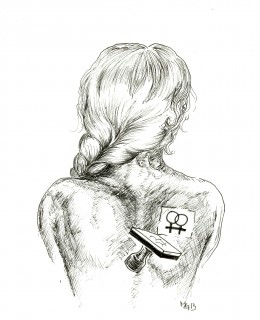
On Nov. 12, Mary Lambert, the singer on Macklemore’s “Same Love,” is performing on campus as a guest of the Rainbow Pride Union. First off, we’re excited, especially for the LGBTQ community here, but the booking also prompted us to ask some questions. Will Lambert be visiting a campus that embraces the philosophies in “Same Love,” or do we have a lot of work to do?
It’s a societal problem that we’re facing everywhere, and while we like to think of ourselves as a progressive, forward-thinking institution, we find our own campus really to be just as limiting. Being gay means not fitting the norm — the norms of State Street hook-up culture and the norms of social circles. Many students come to Binghamton University just to become typecast within their friend group, making them uncomfortable with coming out, or even experimenting, because being anything but straight is treated differently. It’s treated like an “Are they or aren’t they?” issue, when in reality nobody’s sexuality is anyone’s business but his or her own.
This narrow understanding of sexuality is a national problem, not a campus problem. But it’s evident throughout our student population. We have posts on Bing-U Secrets daily along the lines of “Where are all of the lesbian girls at, looking to try something new” and “I’m gay but I don’t know where to go, all my friends will judge me.” We don’t have an LGBTQ resource center, a facility that RPU is fighting for, but we shouldn’t even need one in the first place. For LGBTQ students, your resources should be your peers and your school — and many times, they are — but that’s sadly not always the case.
Labels are dangerous, especially in college, where students at most schools are encouraged to explore. It shouldn’t matter if you’re straight, gay or otherwise, but it’s hard to find people who don’t care about those labels. For students who were waiting for high school and its closed-mindedness to end so they could just come out in college, some may find themselves just waiting to graduate now. And that’s wrong.
Next time you question someone’s sexuality or call someone out on their orientation, think to yourself, “Why do I care, how does this affect me and how could this affect him or her?” And think about the environment that is allowed when a person makes someone else’s sexuality an issue. It can be toxic. There are plenty of gay students here who are perfectly happy with their Binghamton experience, but many others have ways to go before they feel comfortable with themselves. And the change doesn’t just start with those students, it starts with all of us.


